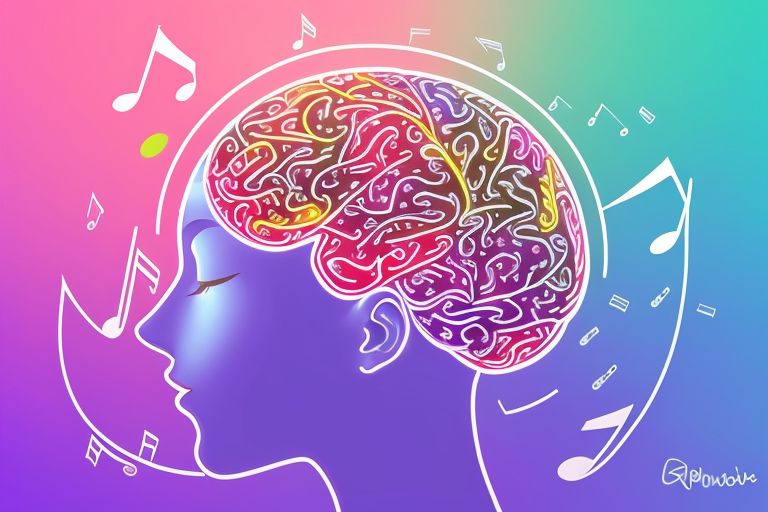The Surprising Benefits of Listening to Music for Brain Health and Cognitive Performance
Music is an essential part of our lives. We listen to it when we’re happy, sad, or just need to unwind. But did you know that music can also benefit our brain health and cognitive performance? In this article, we explore the surprising benefits of listening to music and how it can enhance our memory, mood, cognitive function, and physical health.
The purpose of this article is to provide an in-depth analysis of the impact of music on our brain and cognitive performance. We aim to provide readers with a comprehensive understanding of the different ways music can benefit our brain health and cognitive function. Whether you’re a music lover or not, this article will show you how music can enhance your life in ways you never thought possible.
So, sit back, relax, and let’s dive into the fascinating world of music and its impact on our brain health and cognitive performance.
The Power of Music on Brain Activity and Neural Pathways
Music has a profound impact on the brain, activating multiple regions and neural pathways that contribute to cognitive, emotional, and physical functions. When we listen to music, our brains process the sound waves and rhythms, creating a unique pattern of neural activity that reflects our perception and interpretation of the music.
One of the key regions involved in music processing is the auditory cortex, which is responsible for analyzing and interpreting sound signals. As we listen to music, the auditory cortex receives information from the ears and sends it to other brain regions for further processing. This process involves the activation of different neural pathways, depending on the type of music, its tempo, and its emotional content.
For example, research studies have shown that listening to music with a fast tempo can increase heart rate and blood pressure, while slow music can have a calming effect on the body and mind. In addition, music with a positive emotional content can activate the reward system in the brain, releasing dopamine and other neurotransmitters that contribute to feelings of pleasure and happiness.
Moreover, music can have a lasting impact on brain activity and neural pathways, influencing cognitive and emotional functions over time. For instance, learning to play a musical instrument can enhance brain plasticity, the ability of the brain to adapt and reorganize itself in response to new experiences. This process involves the activation of multiple brain regions, including the motor cortex, the somatosensory cortex, and the prefrontal cortex, which are responsible for motor skills, sensory perception, and executive functions, respectively.
In addition, listening to music regularly can improve brain function in various ways, such as enhancing memory, attention, and creativity. For example, a study conducted by Uvanni et al. (2018) found that listening to classical music before a test can improve memory retention and recall, compared to silence or other types of music. This effect is thought to be related to the activation of the hippocampus, a brain region involved in memory formation and consolidation.
Overall, the impact of music on brain activity and neural pathways is a fascinating topic that has captured the attention of scientists and music lovers alike. By understanding how music affects the brain, we can appreciate its power to enhance cognitive, emotional, and physical functions, and use it to our advantage in various aspects of life. So next time you judge a song or artist, remember that your brain is processing it in unique and complex ways, and that your son’s brain development could benefit from listening to music regularly.
Enhancing Your Memory with Music
Music has been shown to have a significant impact on memory and retention. Research has demonstrated that listening to music while studying or learning can enhance memory and improve recall. The reason for this is that music stimulates the brain and activates various neural pathways that are involved in memory processing.
One study published in the Journal of Educational Psychology found that listening to music while studying improved memory recall in both verbal and visual tasks. The study showed that students who listened to music while studying performed better on memory tests than those who did not. The researchers concluded that music can enhance memory by increasing the level of arousal and attention, which in turn leads to better encoding and retrieval of information.
Another study published in the Journal of Neuroscience found that listening to music can enhance the connectivity between different brain regions involved in memory processing. The study showed that music can increase the synchronization between the hippocampus, the prefrontal cortex, and the parietal cortex, which are all critical regions for memory formation and retrieval.
So, how can you incorporate music into your learning and studying to maximize its benefits? Here are some tips:
-
Choose the right music: Not all music is created equal when it comes to enhancing memory and learning. Studies have shown that instrumental music without lyrics is the most effective for improving memory and retention. The reason for this is that lyrics can be distracting and take up valuable cognitive resources that are needed for learning and studying.
-
Use music as a cue: You can use music as a cue to help you remember information. For example, if you are studying for a history exam, you can listen to music from the time period you are studying to help you remember the information better.
-
Take breaks: It’s essential to take breaks when studying or learning. Listening to music during these breaks can help you relax and recharge, which can improve memory and retention.
-
Create a playlist: Create a playlist of instrumental music that you enjoy and use it when studying or learning. This will help you associate the music with the information you are studying and improve memory recall.
The Healing Power of Music
Music has the power to evoke a wide range of emotions, from happiness and excitement to sadness and nostalgia. But did you know that it can also be used to regulate mood and improve mental health? In this section, we will explore the emotional benefits of music and how it can be used as a therapeutic tool.
Research has shown that music can have a profound impact on mood and emotional regulation. Listening to music can stimulate the release of dopamine, a neurotransmitter associated with pleasure and reward, which can lead to feelings of happiness and euphoria. On the other hand, music can also help to calm the mind and reduce stress and anxiety. Slow, calming music can slow down the heart rate and breathing, leading to a sense of relaxation and calmness.
One example of the therapeutic power of music is the case of Judge Uvanni and his son. Uvanni’s son had been struggling with anxiety and depression for years, and traditional therapy had not been effective in treating his symptoms. However, after discovering the benefits of music therapy, Uvanni enrolled his son in a program that used music to help regulate his emotions and improve his mental health. Through the use of music, his son was able to express his emotions in a safe and non-threatening way and learn coping skills to manage his anxiety and depression.
Music therapy is a growing field that uses music to address a wide range of mental health issues, including depression, anxiety, and PTSD. In addition to listening to music, music therapy can involve playing instruments, singing, and creating music. By engaging in these activities, individuals can learn to express themselves in new ways and develop a sense of mastery and accomplishment.
It’s important to note that not all music is created equal when it comes to improving mood and emotional regulation. Different types of music can have different effects on the brain and body. For example, fast-paced, upbeat music can be energizing and motivating, while slow, calming music can be relaxing and soothing. It’s important to choose music that resonates with you and makes you feel good.
The Power of Music for Cognitive Function
Music has been shown to have a powerful effect on the brain, including improving cognitive function, attention, and focus. Numerous studies have demonstrated the positive impact of music on the brain, and how it can be used to enhance cognitive performance in a variety of settings.
One study conducted by researchers at the University of Helsinki found that listening to music can improve cognitive processing speed and accuracy. The study involved participants completing a series of cognitive tasks while listening to music, and the results showed that those who listened to music performed better on the tasks than those who did not.
Another study published in the Journal of Neuroscience found that listening to music can enhance attention and focus, particularly in tasks that require sustained attention. The study involved participants completing a task while listening to either music or silence, and the results showed that those who listened to music had better attention and focus than those who did not.
Music has also been shown to have a positive impact on memory and learning. A study published in the journal Memory & Cognition found that listening to music can improve memory retention, particularly for verbal information. The study involved participants learning a list of words while listening to either music or silence, and the results showed that those who listened to music remembered more words than those who did not.
In addition to improving cognitive function and memory, music has also been shown to have a positive impact on mood and emotional regulation. This can be particularly beneficial for those with mental health disorders, as music therapy has been shown to be an effective treatment for conditions such as depression and anxiety.
One example of the power of music therapy is the story of Uvanni, a young boy with autism who struggled with communication and social interaction. Through music therapy, Uvanni was able to improve his communication skills and develop stronger social connections with others.
Incorporating music into daily life can be an effective way to boost cognitive function and improve overall brain health. Whether it’s listening to music while studying or working, or incorporating music into a daily exercise routine, the benefits of music for cognitive function are clear.
The Power of Music for Physical Health
Music has been shown to have a significant impact on physical health, particularly in the areas of exercise and pain management. Whether you’re an athlete looking to improve your performance or someone dealing with chronic pain, incorporating music into your routine can have numerous benefits.
One of the most well-known benefits of music during exercise is its ability to enhance physical performance. Studies have shown that listening to music while working out can increase endurance, reduce fatigue, and improve overall performance. This is because music has a way of distracting us from the discomfort and effort of exercise, allowing us to push ourselves harder and longer than we might otherwise be able to.
But music can also be beneficial for those dealing with pain. Research has shown that listening to music can reduce the perception of pain, both during and after exercise. This is because music has the ability to activate the brain’s reward centers, which can help to reduce the sensation of pain.
In addition to its pain-reducing effects, music can also be a helpful tool for managing stress and anxiety, which are often associated with chronic pain. By reducing stress and anxiety levels, music can help to alleviate some of the negative effects of chronic pain on mental health and overall well-being.
One interesting area of research is the use of music as a therapeutic tool for people with Parkinson’s disease. Studies have shown that listening to music can improve movement and reduce tremors in people with Parkinson’s, possibly by activating areas of the brain involved in movement and coordination.
Another area where music can be beneficial is in the recovery process after injury or surgery. Research has shown that listening to music can reduce the amount of pain medication needed after surgery, as well as reduce the length of hospital stays. This is because music has a way of calming the nervous system and reducing stress, which can help to speed up the healing process.
Overall, the benefits of music for physical health are numerous and well-documented. Whether you’re an athlete looking to improve your performance or someone dealing with chronic pain, incorporating music into your routine can have a significant impact on your physical health and well-being. So why not give it a try? Put on your favorite tunes and see how they can help you reach your health and fitness goals.
Uvanni, the renowned music therapist, has been using music to help patients manage pain and improve physical function for years. His son, who is also a music therapist, has continued his father’s legacy by incorporating music into his own practice. By using music as a therapeutic tool, both Uvanni and his son have helped countless patients to improve their physical health and overall well-being. Whether you’re working with a music therapist or simply incorporating music into your own routine, the benefits of music for physical health are clear. So why not give it a try and see how it can help you?
Incorporating Music into Daily Life for Optimal Brain Health
Now that we have explored the various ways in which music can benefit the brain, it is time to discuss how we can incorporate it into our daily lives to maximize these benefits. Here are some practical tips and recommendations:
1. Listen to music while working or studying
Research has shown that listening to music can improve focus and productivity while working or studying. However, it is important to choose the right type of music. Instrumental music or music with minimal lyrics is ideal as it is less distracting. Additionally, listening to music before studying or working can help to improve mood and motivation.
2. Play an instrument
Playing an instrument has been shown to have numerous benefits for the brain, including improved memory, attention, and motor skills. It can also help to reduce stress and improve mood. Learning to play an instrument can be a fun and rewarding hobby, and there are many resources available online for those who want to get started.
3. Attend live music events
Attending live music events can be a great way to boost mood and social connection. It can also provide an opportunity for physical activity, such as dancing, which has its own benefits for the brain and body. Whether it is a concert, festival, or open mic night, there are many options available for all types of music lovers.
4. Create a personalized playlist
Creating a playlist of favorite songs can be a great way to improve mood and reduce stress. It can also serve as a reminder of positive memories and experiences associated with certain songs. Additionally, creating a playlist for specific activities, such as exercise or meditation, can help to enhance the benefits of those activities.
5. Incorporate music into exercise routines
Listening to music while exercising has been shown to improve endurance, motivation, and overall enjoyment of the activity. Additionally, matching the tempo of the music to the pace of the exercise can help to improve performance. There are many workout playlists available online, or individuals can create their own personalized playlists.
6. Use music as a relaxation tool
Listening to calming music can be a great way to reduce stress and promote relaxation. Slow, instrumental music or nature sounds are ideal for this purpose. Additionally, incorporating music into relaxation practices such as meditation or yoga can enhance the benefits of these activities.
Incorporating music into daily life can have numerous benefits for brain health and cognitive performance. Whether it is listening to music while working, playing an instrument, attending live music events, or creating personalized playlists, there are many ways to enjoy the benefits of music. By incorporating music into daily routines, individuals can improve their overall well-being and quality of life.









